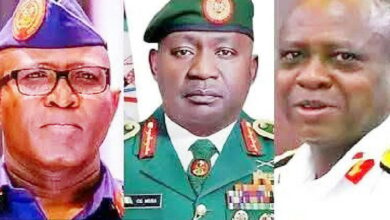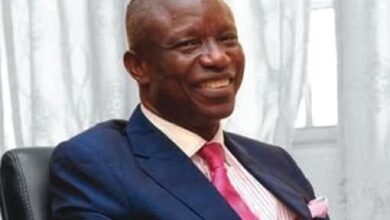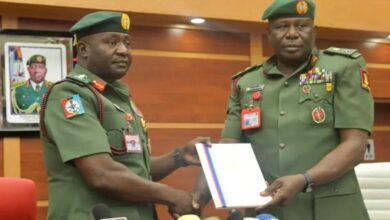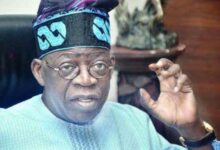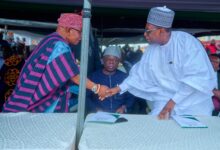Back your commitments with sincere actions, Nigeria told
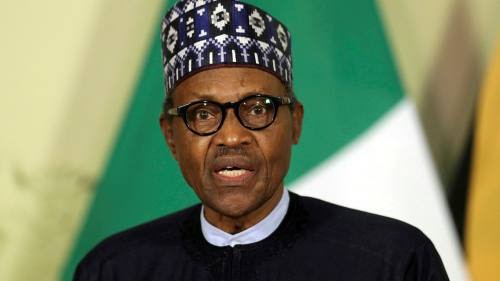
By BASHIR ADEFAKA
The authorities in Nigeria have been asked to ensure independence of anti-corruption agencies and back up their commitments with sincere actions, by prioritizing the fight to combat dirty money in the Nigerian politics.
The Civil Society Legislative Advocacy Centre (CISLAC), the National Chapter of Transparency International (TI) in Nigeria, stated this while felicitating with law abiding Nigerian citizens, anti-corruption activists and other state and non-state actors on occasion of this year’s anti-corruption day.
CISLAC, in a statement issued and signed by its Executive Director, Auwal Umar Ibrahim Rafsanjani, copy of which was sent to The DEFENDER on Thursday, “highly commends President Joe Biden and the United States Government for the Democracy Summit. We commend the Nigerian Government, as well, for committing to participate in this timely global gathering of democrats and changemakers.”
Democracy, the world over, faces intractable challenges that threaten the fundamental freedoms and the promise of development that were once considered the key signposts of democracy, the CISLAC boss noted.
And that, “In Africa, democracy has witnessed rapid rollback in many countries, including Mali, Guinea, and Sudan where military coups have led to suspension of constitutional democracy. In Uganda, Burkina Faso, Cameroun, and Equatorial Guinea, elected Presidents have used instrumentalities of the state to circumvent constitutional guardrails and perpetuate themselves in office.”
CISLAC, however, noted that, “All this while corruption, lack of accountability, authoritarianism, and poor governance continued to lock the continent in violent conflicts, death, disease, and insecurity that threaten a return of the 1970s and 1980s Africa.
“Across Africa, the civic space and vocal civic leaders have become targets of state-sponsored attacks, to gag free speech and curtail civic activism.”
All of these challenges facing democracy globally, the transparency and accountability demanding group are not different to what is happening in Nigeria.
However observed that the current administration’s failure to timely check what it described as legacies of misgovernance inherited from the past government upon its coming on board in 2015, has howevered the unfortunate security situation in the country.
“In Nigeria, the story is not different. President Muhammadu Buhari’s failure to quickly tackle the legacies of misgovernance inherited after coming to office in 2015 and missteps by the administration has sunk the country deeper into widespread insecurity, unemployment, poverty and inequality, voter apathy, corruption and impunity, extra-judicial killings and high-handedness among law enforcement and security agencies, and a widening distrust for government among citizens.
“The world still remembers the unprovoked mauling of young Nigerians during the #EndSARS protest, in Lagos.
“We therefore call on the Nigerian government not to see the 2022 Summit for Democracy as another photo-op, and instead roll up the sleeves to use the opportunity to mobilize partnerships and resources necessary to tackle corruption and impunity which currently poses the greatest existential threat to Nigeria.”
Listing issues it wanted the Nigerian government to commit to tackling, CISLAC asked it to address dirty money in Nigerian politics and the public sector.
It listed, “1). The Nigerian government must immediately commit to the independence of anticorruption agencies and prioritize the fight to combat dirty money in politics.
“The lack of independence for the anticorruption agencies affects funding, appointment, tenure of office of heads of the agencies, and their operational independence. This affects the ability of the agencies to take bold actions against dirty money, despite actionable intelligence and financial data leaks like the recent Pandora papers report.
“These agencies find it hard to act on the illicit financial outflows. It is estimated that Nigeria loses about $18 billion annually.
“Therefore, we call on the Nigeria government to: A) Establish public, central beneficial ownership registers of legal entities and arrangements.
“B) Mandate and resource public authorities to establish mechanisms to independently verify the accuracy of beneficial ownership information provided by legal entities and arrangements.
“C) Require foreign companies investing in Nigeria to abide by the same beneficial ownership transparency requirements as domestic actors.
“D) Apply proportionate and dissuasive sanctions to companies and individuals in cases of noncompliance.
“E) Record and publish beneficial ownership information of companies awarded public contracts or concessions.
“F) Investigate the Panama, Paradise and Pandora leaks and publicly publish the reports.”
Continuing it said asked government to regulate enablers of corruption.
“President Buhari to commit to addressing major corruption enablers but mandating the Central Bank of Nigeria (CBN), the Nigerian Financial Intelligence Unit (NFIU) and relevant anti-graft and law enforcement agencies to prioritize and ensure financial institutions and professionals as well as designated non-financial businesses adhere to existing Know Your Customer (KYC), Customer Due Diligence (CDD) as well as Enhanced Due Diligence (EDD) requirements to prevent the cross border flow of Nigeria’s resources through illicit means by politically exposed persons, business persons, religious bodies, private individuals and their collaborators.
“The Ministries of Justice and Foreign Affairs should work in cooperation with their international counterparts to ensure that global enablers/intermediaries like lawyers, notaries, accountants who help facilitate money laundering and tax evasion are sanctioned appropriately while stolen assets belonging to Nigeria are repatriated.”
It said, “Specifically, the government should commit to: A) Extend anti-money laundering rules to all professionals and entities providing services bearing risks of money laundering.
“B) Require gatekeepers to identify the beneficial owners of their clients, including both domestic and foreign politically exposed persons (PEPs), conduct enhanced due diligence on high-risk customers and report suspicious transactions to competent authorities.
“C) Ensure adequate powers as well as technical, human, and financial resources for supervisory authorities, law enforcement and Nigeria financial intelligence unit to fulfill their responsibilities.
“D) Subject gatekeepers to dissuasive and proportionate sanctions, ranging from license withdrawal to monetary fines for noncompliance with anti-money laundering obligations. Sanctions should cover both legal persons and senior management.”
CISLAC urged the government to support anti-corruption activists and whistleblowers.
“The Nigerian government must ensure that actions by state actors and non-state actors leading to the shrinking civic space as observed by the CIVICUS and Freedom House stop.
“The government must commit to defend whistleblowers, journalists, anti-corruption activists and human rights defenders.”
Specifically, the government, it said, should commit to: “A) Support engagement with investigative journalists and civil society organizations for systemic change.
“B) Establish specific funds to support anticorruption practitioners such as whistleblowers.
“C) Develop a framework for public interest organizations to bring collective compensation claims on behalf of victims of corruption.
“D) Provide credible and well-functioning corruption reporting mechanisms that allow citizens and civil society organizations to report corruption safely and confidentially.
“E) Ensure that legislation regulating non-profit organizations does not restrict the capacity of civil society Human Rights Defenders (HRDs) to operate.
“F) Prioritize the passage and implementation of comprehensive whistleblower protection laws, in line with international standards and best practice, and ensure that whistleblower protection legislation is effectively implemented and enforced.”
CISLAC said, “We urge the government to adopt these specific commitments, which will display commitment to democratic principles and strengthening human rights.
“Strong anti-corruption commitments are further needed to prove the seriousness of the zero tolerance to corruption as repeated by the government. We further encourage adopting new and bold actions instead of repackaging the same commitments made in different forums on the international stage.
“On our part, we assure the government of our highest support in implementing and supporting above mentioned actions. We believe that these specific recommendations will display Nigeria’s strong international reputation at the US-led Democracy Summit,” he said.


